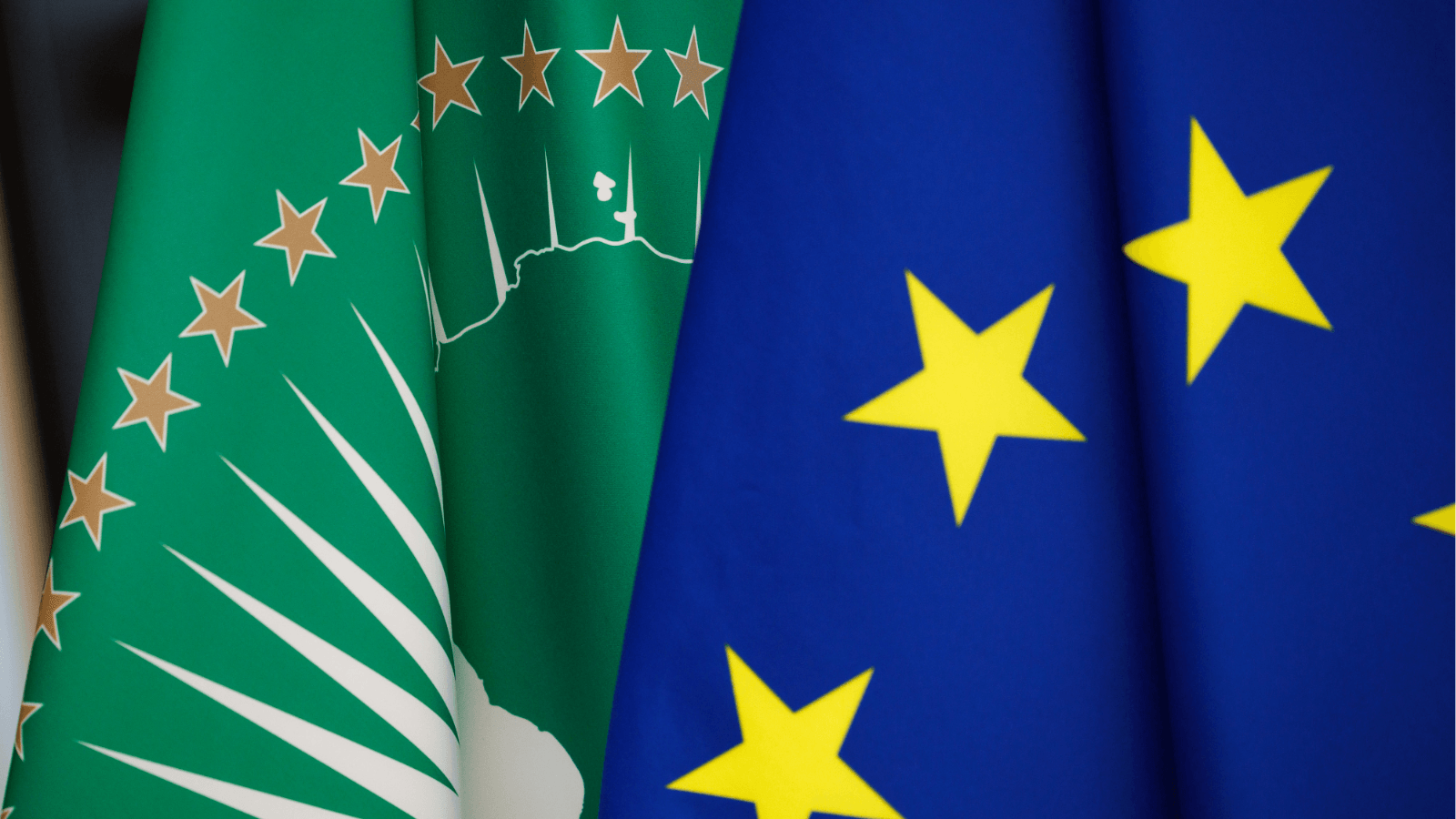AU-EU 2025 Ministerial Meeting sets the tone for upcoming Summit
Leaders reaffirmed commitments to multilateralism and peace but failed to deliver concrete support for girls and young women affected by crisis.
4 June 2025The AU-EU Ministerial Meeting on 21 May 2025 reaffirmed key commitments to shared values, multilateralism, and the peaceful resolution of conflicts. Yet, it fell short of making strong, explicit pledges to support girls and young women in all their diversity, particularly those affected by conflict and crisis.

African Union and European Union flags. Copyright: European Union, 2022. All rights reserved. Photographer: Christophe Licoppe. Retrieved from the European Commission Audiovisual Portal in May 2025.
On 21 May 2025, the 3rd African Union-European Union Ministerial Meeting concluded with renewed commitments to the Joint Vision for 2030, setting the tone for the upcoming 7th AU-EU Summit in 2025. Marking 25 years since the inaugural Cairo Summit, ministers emphasised shared priorities across peace, prosperity, and sustainable development.
It is girls and young women who suffer the most because of the conflict, disproportionately affected and subjected to unimaginable atrocities. Their voices, experiences, and wellbeing must be at the heart of every political decision and commitment.
Mohammed Hamid, Project Coordinator, Plan International Sudan
The meeting showed encouraging signs of commitment to gender equality, youth empowerment, and education, but fell short in several areas. Positive developments included reaffirmed support for the Women, Peace and Security (WPS) agenda, recognition of children’s specific vulnerabilities in humanitarian settings, and emphasis on youth skills development and digital innovation. The Global Gateway was also acknowledged as a positive across eleven key areas, including health, education, energy, and youth employment.
However, the communiqué lacked specific, actionable commitments, particularly for girls and young women.
“We witness the devastating impact of Sudan’s conflict on girls and young women every single day.” says Mohammed Hamid, Project Coordinator at Plan International Sudan. “It is girls and young women who suffer the most because of the conflict, disproportionately affected and subjected to unimaginable atrocities. Their voices, experiences, and wellbeing must be at the heart of every political decision and commitment.”
The document included no mention of targeted funding for women-led initiatives, nor of key issues like sexual and reproductive health and rights (SRHR), childcare, or social protection. Despite being disproportionally impacted, girls were not explicitly referenced in education or protection contexts, and there was no mention of child marriage, gender-based violence, or inclusive education frameworks like the Safe Schools Declaration. Lastly, education was largely framed in economic terms, missing its broader role as a human right and as a critical enabler of human development.
Young people as drivers of change in AU-EU partnership
Ahead of the AU-EU Ministerial Meeting, a virtual CSO-Youth side event on 20 May brought young voices to the forefront. The forum led to the adoption of a Joint Declaration of Civil Society and Youth, presented to the Ministers at the closing session.
We must listen to the overlooked voices of Sudanese girls and women affected by war.
Hala, young advocate from Sudan
The AU-EU Joint Vision rightly acknowledges the critical role of youth and civil society in shaping the partnership’s future, with commitments to invest in education, skills, entrepreneurship, and employment. Their engagement in areas like migration and peace and security is essential, and the inclusion of this side event signals a welcome step toward amplifying youth voices at the highest levels.
Hala, a young woman from Sudan and a Plan International advocate, participated in the event to bring forward the priorities of her and her peers and ensure youth voices are central to the AU-EU discussions. Following the event, Hala insists that “”we must listen to the overlooked voices of Sudanese girls and women affected by war. Their experiences reflect survival and resilience. Their role in peacebuilding is not optional, it is essential.”
To that end, Plan International strongly supports the creation of dedicated spaces for youth and civil society to influence decision-making. However, space alone is not enough. These platforms must be safe, inclusive, and genuinely empowering, especially for young women from diverse backgrounds.
We call on leaders to ensure that youth priorities are not only heard but actively shape outcomes. This requires more than mere presence; it requires meaningful participation. Early, well-planned engagement is essential to avoid tokenism and encourage authentic involvement. Young people’s involvement should begin well in advance, continue throughout, and extend beyond such meetings.
There is still much room for improvement, and we urge future efforts to build on past lessons to become more inclusive, effective, and transformative for all. This is not a luxury but a necessity for impactful, sustainable, and just solutions.
Young people don’t just want a voice, they want a seat at the table, with the power to co-design.


